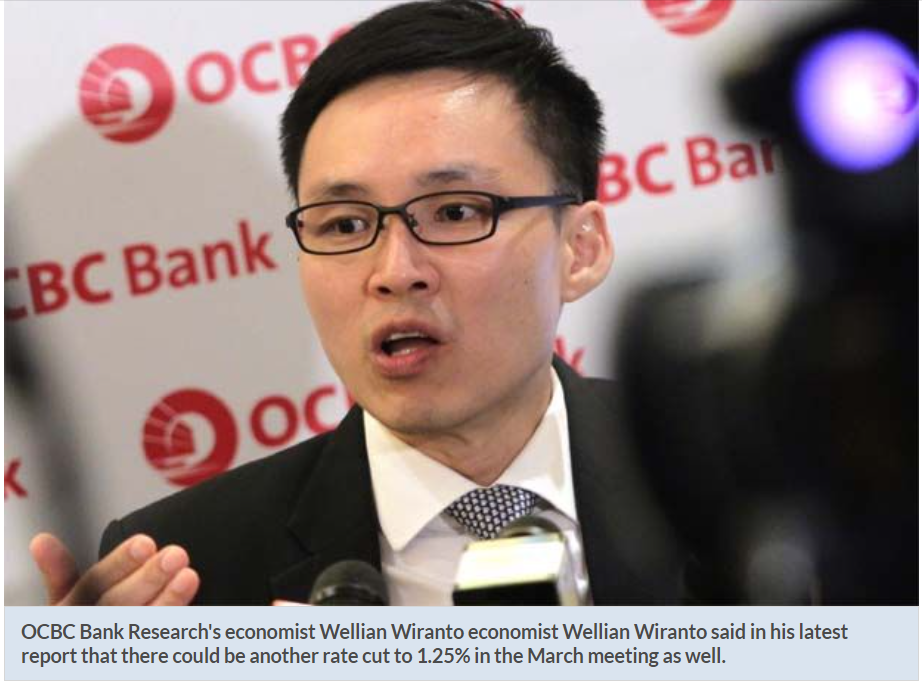Malaysia: Bank Negara may cut OPR at Jan 20 meeting
KUALA LUMPUR: OCBC Bank Research expects Bank Negara to likely reduce the overnight policy rate (OPR) by 25 basis points to 1.50% at its Jan 20 monetary policy committee meeting due to the weaker economic outlook.
The bank’s global treasury, research and strategy economist Wellian Wiranto said in his latest report that there could be another rate cut to 1.25% in the March meeting as well.
He said Malaysia’s move to reimpose the movement control order’s (MCO) restrictions and state of emergency could impact economic growth as the government stepped up its measures to bring the Covid-19 pandemic under control.
The MCO will come into effect today and it covers the most economically active regions which contribute more than two-thirds of Malaysia’s GDP.
Wellian pointed out that together, Selangor, Penang, Johor, Melaka, Sabah and Kuala Lumpur commanded a hefty 67.7% of the economy.
“With its recovery momentum stymied, it will be even harder now for the economy to reach the 6.5%-7.5% GDP growth target that the government has in mind, making it tough to envision any grand fiscal largesse to counter the blow, even as the declaration of state of emergency gives it some wiggle room.
“Hence, Malaysia would continue to have to lean more heavily on monetary support. Bank Negara is likely to cut its OPR once more on Jan 20, ” he said.
Wellian said the state of emergency and the MCO were imposed after the coronavirus pandemic scourge afflicted Malaysia at an increasingly alarming rate.
For one, the MCO re-imposition came as Malaysia started to see daily cases breach the 3,000 mark last week, putting the healthcare system under siege.
Already, there are reports suggesting that ICU beds in some hospitals in KL are full. Without the latest measures, Prime Minister Tan Sri Muhyiddin Yassin reckoned daily cases could surge to as high as 8,000 by May.
“In an apparent step to bolster the government’s response, the PM requested the enactment of a state of emergency from the King. Unlike his previous attempt to do so in late October 2020, the King has acquiesced to the request this time round.
“It appears that the risk of seemingly unceasing uptick in new cases has tipped the balance this time round. Even set against the potential for vaccine rollout – with Malaysia slated to receive the initial vaccine doses from Pfizer/BioNTech in February – the reality is that it would take a good part of the later part of this year for such efforts to make a difference in the fight, ” he said.
Wellian said the dramatic turn of events would inadvertently challenge the nascent recovery that the Malaysian economy has started to eke out.
Already, even as growth surprised on the upside in third-quarter 2020, he had cautioned before that the fourth quarter momentum might be more challenged.
“The latest measures could see growth becoming more curtailed in the first quarter, in particular. Even as exports continued to show signs of benefiting from a recovery in demand in electronic goods, the domestic segment would likely to continue to be a drag – and even more so now.”
Wellian also pointed to the still-elevated unemployment rate that has ticked upwards, putting pressure on consumption.
While, as it stands, the MCO is slated to last only for two weeks, it may well be extended unless the number of cases start to come down dramatically in the coming week or so.
Indeed, if it is any indication, the accompanying state of emergency is valid for a much longer period of all the way through to Aug 1, even if it can technically be cut short if a consultative committee that is to be set up by the Prime Minister determines there is no longer any need for it.
“All in all, we see downside risks to our 2021 GDP forecast. Previously at 6%, it is already relatively low compared to the 6.5%-7.5% range targeted by the government and latest 6.8% consensus.
“However, the culmination of recent events and the distinct likelihood that the MCO may be extended beyond the current stipulated period of two weeks are likely to pressure on first quarter growth further.
“Indeed, we see the risk that the economy will shrink on both a sequential and year-on-year basis in the first quarter, with growth rates of -0.6% quarter-on-quarter and -0.1% year-on-year, respectively. For the year as a whole, growth rate now is likely to be 5.7% year-on-year in our new baseline thinking, ” Welian said.
Source: https://www.thestar.com.my/business/business-news/2021/01/13/bank-negara-may-cut-opr-at-jan-20-meeting


 English
English




